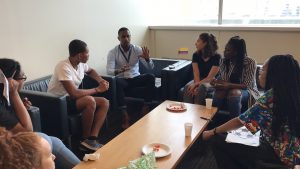Summer Mentorship Program Gets World Cup Fever as it Tackles the Basics of Public Health
July 15/2018
By: Francoise Makanda, Communications Officer, DLSPH
A viral disease spreads through Qatar as it hosts the 2022 FIFA World Cup, the most watched and anticipated sporting event in the world.

Phd Candidate Chris Tait mentors Summer Mentorship Students on July 12, 2018 as they complete a World Cup inspired case study.
Its presence threatens the livelihood of everyone involved: performers, players, fans and venue workers are at high-risk of contracting the deadly and unidentifiable disease.
It has already claimed the lives of many and could cancel the international event that only happens every four years. What advice would a group of public health practitioners give?
This scenario was presented to students at the 2018 International Emory Global Health Case competition and this month, DLSPH adapted the case for 74 Summer Mentorship Program (SMP) students 16 to 18 years of age in a hands-on public health learning experience.
“Often SMP students come in wanting to be doctors, but many have told us that they’ve become more aware of the diversity within public health and they enjoy the case study format,” said Anita Benoit, Assistant Professor of Social and Behavioural Health Sciences, who has facilitated SMP’s public health component for three years.
This year, Benoit co-facilitated the program with Uttam Bajwa, Research Associate at DLSPH, with a shared goal to generate excitement about public health as a future area of study.
The SMP has a 20-year history at U of T Medicine where high school students of Indigenous or African ancestry can explore health sciences over four weeks in July. DLSPH has led a Public Health Day within the SMP for the past several years, but this was the first time that students participated in a case study, a practical and engaging learning experience.
Facilitators picked a case that resonates with the ongoing spectacle that is the World Cup and students were asked to develop and present an emergency plan with three priority responses to manage an infectious disease outbreak with the potential to affect millions of people.
SMP students were mentored by DLSPH alumni and faculty, as well as health promoters, bioethicists, epidemiologists, emergency preparedness and infectious disease experts, and people working in global health.
“The case reflects the challenges and ethical dilemmas that public health practitioners think about, and many of the mentors who met with students this year have experience in public health emergency preparedness and infectious diseases, including Toronto’s SARS outbreak and the 2014 Ebola crisis in West Africa,” said Bajwa.
In small groups, students presented their recommendations to judges, including Benoit and Bajwa as well as Professors Erica Di Ruggiero, Director of the Office of Global Public Health Education and Training, and Rhonda Cockerill, Director of IHPME.
Students forfeited a month of their summer break to spend a balmy summer day at U of T researching this challenging topic. For many, the sacrifice was well worth it.
“I really liked the case study in addition to the lecture,” said Chanté Hamilton, a student at Sinclair Secondary School who already had a keen interest in public health through her interest in advocacy.
“The case study is hard because you can’t just look at it from one perspective. You have to take into account the immigrant workers, the employers, how it will affect social media and the things you want to mitigate. Prioritizing is the whole thing for me. It’s fun to think about the case study from all angles,” said Hamilton.
Hamilton is strongly considering applying to U of T, and then to public health for graduate studies, which is a goal that pleases both facilitators.
“Equity is a core value of public health. The SMP program has a long history of supporting equity and inclusion for groups that have been underrepresented in health fields,” said Bajwa.
With the quality and breadth of work put into these presentations, current public health practitioners can rest assured that the future is bright.